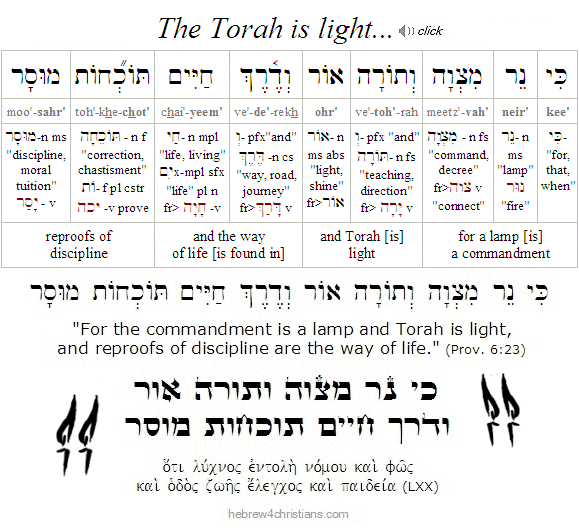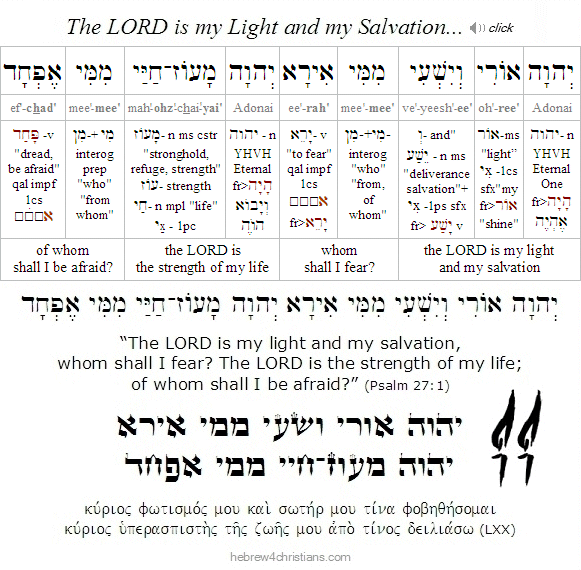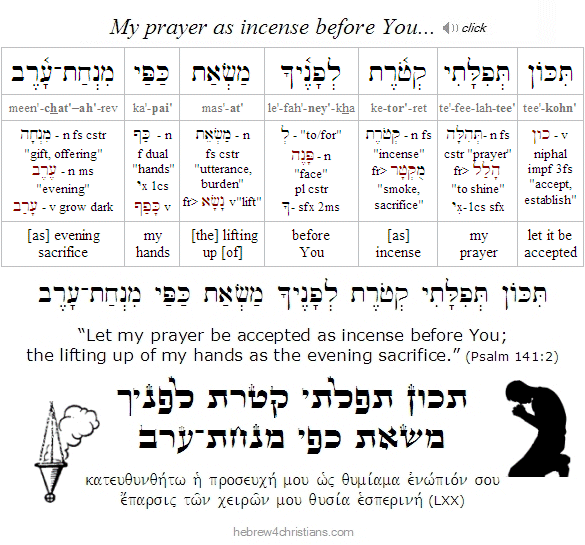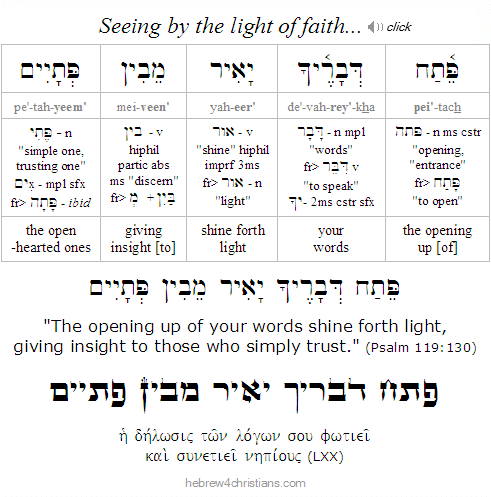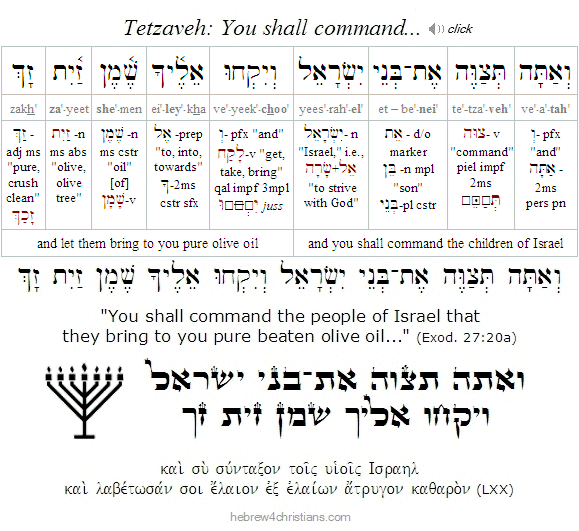|
March 2020 Updates (continued)
Note: If any page content appears to be missing, please refresh the page...
Priests of His Light...
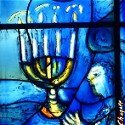
03.06.20 (Adar 10, 5780) Our Torah for this week (i.e., parashat Tetzaveh) describes the ceremony of consecration to the priesthood. We are chosen to be a "kingdom of priests," a set-apart people, and a light to the nations (Exod. 19:6; Isa. 42:6; 1 Pet. 2:9). Note the very first responsibility given to the priests was to care for the ner tamid (נר התמיד), the light of the Menorah (Exod. 27:20-21), which represents our consciousness of the Divine Presence (Psalm 18:28; 36:9). The challenge we all face is to remain "in the light as God is in the light" and not to be seduced by the world of fleeting appearances (Isa. 2:5; 1 John 1:7, 2:17). God's eternal light radiates through all things (Isa. 6:3; Psalm 139:11-12), just as the great "yehi ohr" (יְהִי אוֹר) - "Let there be light" - is the first word spoken to creation (Gen. 1:3). To be a priest means being so filled with the truth that you radiate peace; your inner light shines and you glorify your Father in heaven (Matt. 5:16). That is how we draw others to the truth, by receiving the beauty of the LORD (Psalm 27:4).
Of course being a "witness to the light," that is, being a "priest," does not mean you are a "perfect person" who walks about with a blissed-out attitude despite the various trials and tests we all face in this life. No, we all still sin, and we therefore need to confess the truth of our condition to abide in the light (1 John 1:9; James 5:16). Like everything else in Scripture, here we encounter paradox, as Yeshua taught: "Blessed are the impoverished in spirit (πτωχοὶ τῷ πνεύματι), for theirs is the kingdom of heaven; blessed are the ones who mourn (οἱ πενθοῦντες), for they shall be comforted; blessed are the meek (οἱ πραεῖς), for they shall inherit the earth" (Matt. 5:3-5). Yea, "God chose what is foolish in the world to shame the wise; God chose what is weak in the world to shame the strong, God chose what is low and despised in the world, even things that are not, to bring to nothing things that are, so that no human being might boast in the presence of God" (1 Cor. 1:27-29).
The Hebrew word for priest (i.e., kohen: כּהֵן) may come from the word ken (כֵּן) meaning "yes" and the word kivun (כִּווּן) meaning to "direct" or "lead," implying that a priest helps direct a person toward affirming the Reality and Truth of God. The role of a priest is to draw us to God, then, but how is that possible if the mediator cannot genuinely understand our sorrows and struggles? What draws others to God is his love, but how can we come to believe in that love were it not for the priesthood of the leper, the priesthood of the outcast, the priesthood of the reject? Even so Yeshua was afflicted with our infirmities and therefore sympathizes with our brokenness and frailty (see Heb. 4:16).
As a priest of brokenness, you are called to be a wounded healer, and you can testify of God's saving grace and love for you despite your sorrow, anger, weaknesses, and failures... Accepting God's compassion for you - just as you are - allows you to show grace and kindness to others who are also hurting, and therefore you can serve as a priest of God.
אֱלהִים יְחָנֵּנוּ וִיבָרְכֵנוּ
יָאֵר פָּנָיו אִתָּנוּ סֶלָה
E·lo·heem · ye·cho·nei'·noo · vee·va·re·khei'·noo
ya'eir · pa·nav · eet·ta'·noo · se'·lah

"May God be gracious to us and bless us
and make his face to shine upon us, Selah"
(Psalm 67:1)

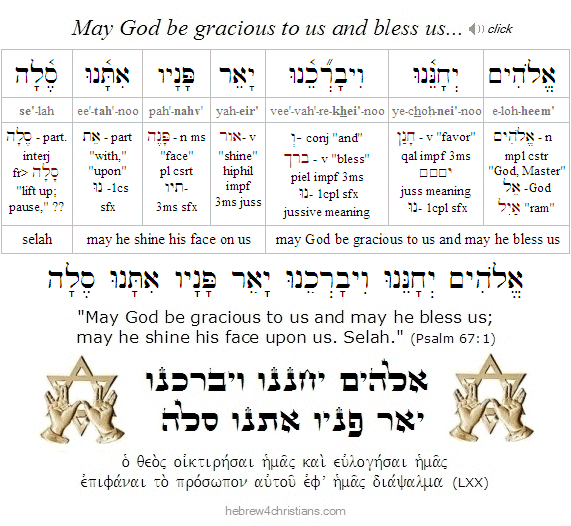
Be encouraged, friends... "For the commandment is a lamp and Torah is light, and the reproofs of discipline are the way of life" (Prov. 6:23). Here we may understand the "reproofs of discipline" as the (ongoing) process of consciously turning away from darkness (of fear, anger, etc.) to the behold the divine light. We have to start here, after all... The way of life is teshuvah (repentance, turning to God), which is a painful process to the lower nature, but is necessary to walk in the light. Confession brings light into our hearts (James 5:16; 1 John 1:5-9), and the end of our struggle is healing and life.
Names upon his heart...
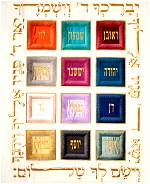
[ The following is related to this week's Torah reading, parashat Tetzaveh... ]
03.06.20 (Adar 10, 5780) The two onxy stones attached to the shoulder pieces of the High Priest's vest (i.e., ephod: אֵפד) and the twelve precious stones arrayed his breastplate (i.e., choshen: חשֶׁן) were inscribed with the names of the tribes of Israel. "And Aaron shall bear their names before the LORD on his two shoulders for remembrance" (Exod. 28:12). "So Aaron shall bear the names of the sons of Israel in the breastpiece of judgment (i.e., choshen ha'mishpat: חשֶׁן הַמִּשְׁפָּט) upon his heart, when he goes into the Holy Place, to bring them to regular remembrance before the LORD (Exod. 28:29). The sages comment that just as a father carries his young child on his shoulders, or a shepherd his lamb, so the High Priest carries his people before the LORD in intercession. Similarly, at the cross Yeshua carried our names on his shoulders, bearing the burden of our sins as he cried out before the Father. As our great High Priest of the New Covenant, Yeshua "bore the judgment of the people upon his heart" as he made intercession for them (Isa. 53:12; Rom. 8:34).
"Behold, I have engraved you on the palms of my hands" (Isa. 49:16); "set me as a seal upon your heart, as a seal upon your arm" (Song 8:6).
God of Second Chances...
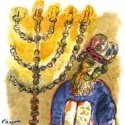
[ The following is related to this week's Torah reading, parashat Tetzaveh... ]
03.05.20 (Adar 9, 5780) "Now this is what you shall do to them (i.e., Aaron and his sons) to consecrate them that they may serve me as priests" (Exod. 29:1). The question may be asked why the LORD chose Aaron and his sons for this great honor, especially since the patriarch Jacob had excluded Simon and Levi from leadership during his prophetic deathbed "blessing" delivered to his children: "Let my soul come not into their council... Cursed be their anger, for it is fierce, and their wrath, for it is cruel. I will divide them in Jacob and scatter them in Israel" (Gen. 49:6-7). The very tribe consigned to anonymity, however, was chosen and restored to become the tribe of God's priesthood in Israel, which shows that our merciful God bestows second chances for us to serve him. Likewise the Gentiles, who were once "strangers and outsiders" to the covenants and blessings of ethnic Israel, have been brought near by the blood of Messiah, being made fellow citizens with the saints and members of the household of God" (Eph. 2:12-13,19). Therefore, as the Apostle Peter attested: "You (followers of Yeshua) are a chosen race, a royal priesthood, a holy nation, a people or his own possession, that you may proclaim the excellencies of him who called you out of darkness into his marvelous light. Once you were not a people, but now you are God's people; once you had not received mercy, but now you have received mercy" (1 Pet. 2:9-10).
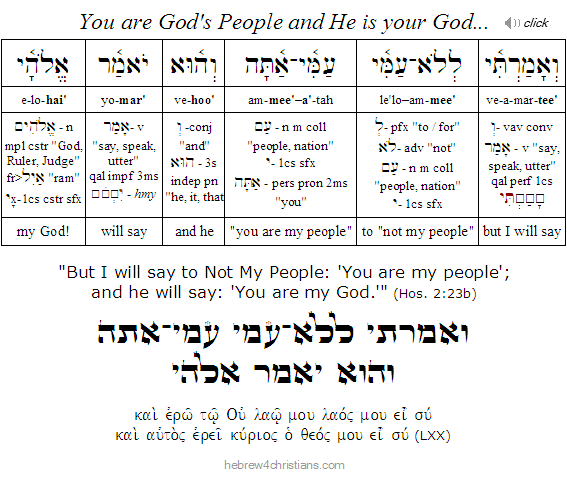 |
Moses and Messiah...
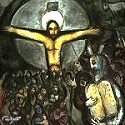
[ The following is related to this week's Torah reading, parashat Tetzaveh... ]
03.05.20 (Adar 9, 5780) Though Moses is of course a central character in the Book of Exodus, and indeed of the entire Torah, it is noteworthy that he is not mentioned even once in our Torah portion this week – a conspicuous absence! The focus shifts away from the social laws of Israel to the realm of the priests: how they should dress, how they should serve God, and so on. Notice how the great vision of the Altar extends beyond the legislative laws of the Torah... Therefore Yeshua said that Abraham rejoiced to see his day, and that Moses wrote of him (see John 8:56; John 5:46, Luke 24:27). Moses wrote of the Messiah directly, of course (e.g., Gen. 22:8, 49:10; Deut 18:15; etc.), though more often he wrote of him indirectly, in the "white spaces of the scroll," so to speak. For instance, God ordained that the sacrifice of the Passover lamb was to be commemorated every evening and morning, along with matzah and wine, as the central sacrifice of the Tabernacle (see Exod. 29:38-42 and Num. 28:1-6), a ritual which foreshadowed the coming of the Great Lamb of God (שֵׂה הָאֱלהִים) who would provide our everlasting atonement (John 1:29).
Note: If the law represents the "Tree of the Knowledge of good and evil" (note, not just knowledge of evil, but of both good and evil), then the remedy is found by partaking of the Tree of Life (עֵץ הַחַיִּים), which was also "in the midst" of the garden (בְּתוֹךְ הַגָּן) but was separate from it (Gen. 2:9). Likewise God gave the moral law at Sinai and at the same time gave the vision of the altar, the "life-for-life" exchange that overcame the demands of the moral law by sacrificial love... The Tree of Life is Messiah, who fulfills the demands of the law on our behalf and heals us from our separation from God (Rev. 22:2).
Shabbat Zakhor and Purim...
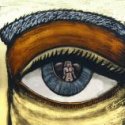
03.05.20 (Adar 9, 5780) The Shabbat that immediately precedes the holiday of Purim is called Shabbat Zakhor (שבת זכור) - the "Sabbath of Remembrance"- a time when we remember the terrible end of the enemies of God... In particular, the Maftir (additional Torah reading) commands us to remember (zakhor) how the nation of Amalek functioned as Satan's emissary by attacking the Israelites at Rephidim, immediately following the Exodus from Egypt (see Exod. 17:8-16). After Israel routed the attack, God told Moses, "Write this as a memorial in a book and recite it in the ears of Joshua, that I will utterly blot out the memory of Amalek from under heaven. So Moses built an altar and called the name of it: Adonai Nissi (יהוה נסי), 'the LORD is my Banner,' for a hand is upon the LORD's banner (כי־יד על־נס יה) -- the LORD will war against Amalek for all generations" (Exod. 17:16).
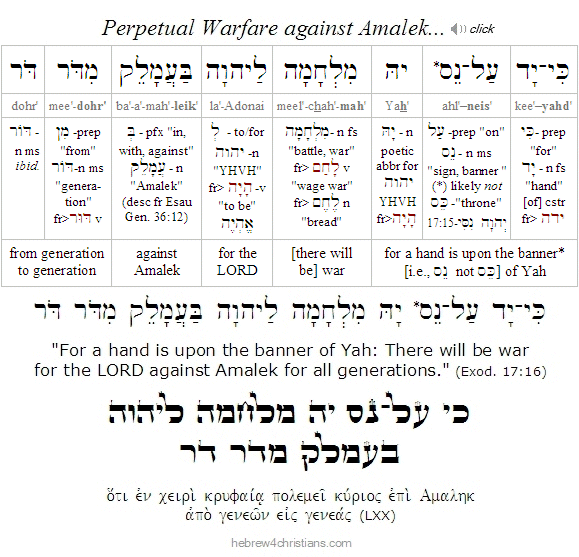 |
Moses later explained that Amalek did not fight using conventional methods of war but rather attacked and killed the weakest members of Israel, "those who were lagging behind" in the camp (Deut. 25:17-19). This cowardly approach represented the first attack of God's newly redeemed people, a Satanic assault that God vowed never to forget.... Amalek therefore embodies satanic forces arrayed against the people of God.
Amalek represents the legacy of Esau and his hatred of Israel in the world (Gen. 36:12). Indeed the name Amalek (עֲמָלֵק) begins with the letter Ayin (symbolizing the eye) and equals 240 in gematria -- the same value for safek (סָפֵק), meaning "doubt," and for rahm (רָם), meaning "haughty." Amalek therefore represents "the evil eye of doubt," or even "the severed eye" (i.e., when you remove Ayin (ע) from "Amalek," you are left with malak (מָלָק), a verb that means "to chop off" or to sever). Understood in this way, Amalek represents spiritual blindness acting arrogantly in the world...
The Torah says that we must "go out and fight" Amalek, which is a call to ongoing spiritual warfare in our lives (Deut. 25:17-19). When Moses raised his hands in battle against the Amalekites, the Israelites prevailed, but if he lowered them, they suffered defeat (Exod. 17:11). Eventually Moses grew weary and needed Aaron and Hur to help him hold his arms steady to ensure victory (Exod. 17:12). Note that the Hebrew word translated "steady" is emunah (אֱמוּנָה), the word for faith... It was Moses' steady faith in God's power that gave Israel the victory over the powers of darkness, just as we lift up our faith in God's power demonstrated at the cross gives us the victory over Satan and his schemes.
The additional Haftarah portion (1 Sam. 15:2-34) speaks of how King Saul later failed to "devote to destruction" King Agag of the tribe of Amalek -- a mistake which cost him the kingship of Israel. Samuel's rebuke of Saul's compromise is always timely: "Behold, to obey is better than sacrifice, and to hearken than the fat of rams.... Because you have rejected the word of the LORD, he has also rejected you from being king" (1 Sam. 15:22-23).
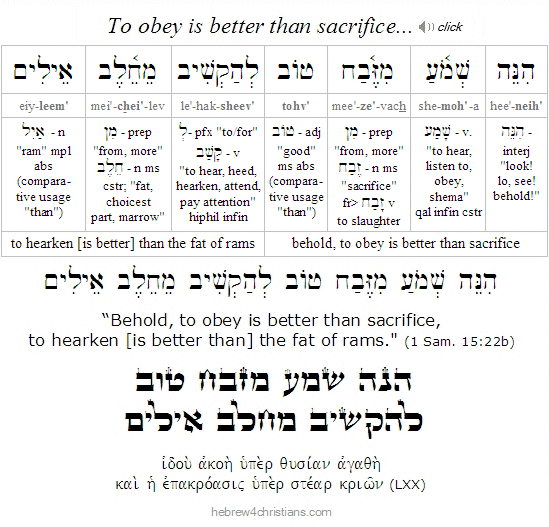 |
Just as the Torah commands us to remember (זָכוֹר) the Shabbat to keep it holy (Exod. 20:8); to remember (זָכוֹר) the Passover redemption (Exod. 13:3), and to remember (זָכוֹר) what God did to Miriam (Deut. 24:9), so we are commanded to remember (זָכוֹר) what Amalek did to Israel (Deut. 25:17). To fulfill this commandment, Jewish tradition publicly recites these verses on the Shabbat before Purim so that the 'wiping-out' of Amalek might be connected with the 'wiping-out' of Haman the Agagite, i.e., a descendant of Amalek (Esther 3:1). In addition, it is customary for Jewish soferim (scribes) to literally blot out the name Amalek when they test their quills before writing a Torah scroll....
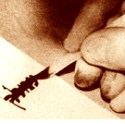
Note: For more on this subject, see "Shabbat Zakhor: Remembering the Fight of Faith."
Intercession and Incense...
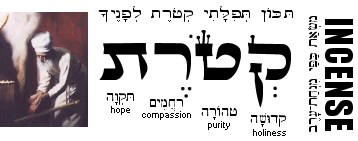
[ The following is related to Tetzaveh; please read the portion to "find your place" here. ]
03.04.20 (Adar 8, 5780) The last item described in the Mishkan (i.e., the "Tabernacle") was a golden "altar of incense" (מִזְבַּח הַקְּטרֶת) that was to be placed inside the Holy Place before the veil separating the Holy of Holies. Every morning and evening the High Priest would burn sacred incense on this altar (symbolizing his prayer and intercession), and the blood of atonement was also applied there during the Yom Kippur service (Exod. 30:6-10). The sages say that the word "incense" – i.e., ketoret (קְטרֶת) – can be thought of as an acronym of the words kedushah (קְדוּשָׁה), "holiness," tahorah (טָהֳרָה), "purity," rachamim (רַחֲמִים), "compassion," and tikvah (תִקוָה), "hope," the very characteristics that marked the passion of Yeshua who interceded for us as he offered his blood before the heavenly kapporet as our High Priest of the new covenant. Indeed, the word ketoret comes from a root word (קטר) that means to offer sacrifice, further alluding to the intercession of Messiah on our behalf (Heb. 7:25). Disciples of Yeshua are likewise called priests of God (Rev. 1:6; 1 Pet. 2:5), and our prayers and service are regarded as a "sweet-smelling savor" offered to the Lord (Rev. 8:4). As it says in the Psalms: "Let my prayer be accepted as incense before You; the lifting up of my hands as the evening sacrifice."
תִּכּוֹן תְּפִלָּתִי קְטרֶת לְפָנֶיךָ
מַשְׂאַת כַּפַּי מִנְחַת־עָרֶב
tee·kohn · te·feel·la·tee · ke·to'·ret · le·fa·ney'·kha
ma·sat · ka·pai · meen·chat · a'·rev

"Let my prayer be accepted as incense before You;
the lifting up of my hands as the evening sacrifice."
(Psalm 141:2)

Personal Prayer Request: I am going to the doctor today for some tests. Your prayers for my health are sincerely appreciated, friends. Thank you - John.
Getting reading for Purim...

[ The festival of Purim begins Monday, March 9th at sundown... Happy Purim Chaverim! ]
03.04.20 (Adar 8, 5780) The Scriptures state that the holiday of Purim "should be remembered and kept throughout every generation, every family, every province, and every city; and that these days of Purim should not fail from among the Jews, nor the memorial of them perish from their seed" (Esther 9:28). According to Jewish tradition, we remember the miracles of Purim by means of four mitzvot (i.e., blessings): 1) Honoring the appointed time as directed by the Scriptures (see Esther 9:26-28); 2) Performing acts of tzedakah and kindness (Esther 9:22; i.e., misloach manot: מִשְׁלוֹחַ מָנוֹת); 3) Hearing the Megillah of Esther read; and 4) Enjoying a special Purim meal together. The Midrash Esther says that Purim, unlike many of the other holidays, will be celebrated even after the final redemption after the End of Days. Maimonides says that the Book of Esther will enjoy the same status as the Torah of Moses in the world to come (Mishneh Torah, Megillah). This is because the story of Purim -- i.e., God's covenantal faithfulness and defense of His people -- will be magnified in the deliverance that leads to the establishment of the Messianic Kingdom upon the earth. Indeed, the Second Coming of the Messiah will be regarded as the final fulfillment of Purim (Rev. 19:11-16).
Purim is all about God's irrepressible, undefeatable, insuperable and sovereign love for His people. Though the wicked seem to sometimes have the upper hand in olam ha-zeh (this present hour), we need not fret or become anxious (Psalm 37:1, Prov. 24:19, Phil. 4:6). God is in control and His love and purposes overrule the counsel of the wicked. He will one day speak to the princes of this dark world in His wrath and terrify them in His fury (Psalm 2:5). God's great vision for Zion, the "City of the Great King," will never fail, friends, nor will His love for those who are trusting in Him. God's sovereign love is our great hope. As King David said, בָּרְכוּ־נָא אֶת־יהוה אֱלהֵיכֶם / Barekhu-na et-Adonai Elohekhem: "Now bless the LORD your God" (1 Chron. 29:20). פּוּרִים שָׂמֵחַ / Purim Sameach: "Happy Purim" chaverim!
 |
HAPPY PURIM CHAVERIM!
For more on the see the article: "Should Christians Celebrate Purim?"
A Blessed Yearning....
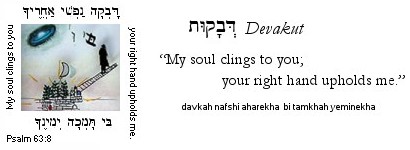
03.04.20 (Adar 8, 5780) There is an "upside-down way" of experiencing heavenly growth and lasting prosperity, though it is not a very popular one: "It was good for me that I was afflicted, that I might learn your decrees" (Psalm 119:71). Affliction is a teacher... There is a blessing when you feel like you are "falling to pieces" because then you can know "in your bones" that only God can hold you together... Affliction serves as a "leash" of sorts, keeping us close to God's side, helping us number our days to attain a heart of wisdom (Psalm 90:12). As Yeshua said: Ashrei aniyei ha'ruach: "blessed are the poor in spirit," ki la'hem malchut ha'shamayim: "for theirs is the kingdom of heaven" (Matt. 5:3). Such inner poverty is a disguised grace, and the desire for healing reveals the Spirit's invitation. Kotzer ruach (קוֹצֶר רוּחַ) is a phrase that means being short of breath, panting for the Divine Presence, yearning for God. When you are wounded, desperate, and find nothing else within you for life, then you are able to see clearly and to receive the miracle of the divine comfort. "I know, O LORD, that your judgments are right, and that in faithfulness you have afflicted me. Let your steadfast love comfort me according to your promise to your servant. Let your tender mercies come to me, that I may live; for your Torah is my delight" (Psalm 119:75-77).
טוֹב־לִי כִי־עֻנֵּיתִי לְמַעַן אֶלְמַד חֻקֶּיךָ
tov'-lee · khee-oo·nei'·tee · le·ma'·an · el·mahd · choo·kei'·kha

"It was good for me that I was afflicted,
that I might learn your decrees."

Learn to see your daily afflictions as a blessing in disguise, an opportunity for you to develop the precious middah (quality) of patience and endurance... Indeed, it is curse to be devoid of need before the LORD, and therefore affliction is a means to receiving divine comfort.
The students of Rabbi Shimon bar Yochai asked him: Why did the manna not fall once a year [as opposed to once a day]? He answered, I will give you a parable: It can be compared to a mortal king who had a son for whom he provided food once a year; as a result, he saw his son but once a year. Thereupon he provided for his maintenance daily, so that he called upon him every day. The same is with Israel. One who had four or five children would worry and say, 'Perhaps no manna will fall tomorrow, and we will all die of hunger.' Thus they turned their faces to heaven in prayer (Yoma 76a).
Just as God humbled Israel with manna in the desert, so He humbles us. "Give us this day our daily bread..." The purpose of affliction is ultimately good and healing: God humbles us with manna so "that he might make you know that man does not live by bread alone, but man lives by every word that comes from the mouth of the LORD" (Deut. 8:3). In other words, God uses the discipline of affliction to lead us to the truth. We often pray that our problems be taken away, but God sometimes ordains these very problems so that we will draw near to Him... Yeshua told us, "Your heavenly Father knows what you need before you ask Him." Many of us are slow to learn, but God is patient with those whom He disciplines. The goal is to never lose sight of what's most important, which is God Himself.
"I didn't go to religion to make me happy. I always knew a bottle of Port would do that. If you want a religion to make you feel really comfortable, I certainly don't recommend Christianity." - C.S. Lewis: God in the Dock
Hiddenness and Disclosure...
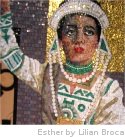
03.04.20 (Adar 8, 5780) The sages extol the importance of the holiday of Purim because it reveals the hidden hand of God, despite his apparent absence in the affairs of this world... On the surface, each turn of the story could be explained naturally, or as simple "coincidence," yet in the end we realize that God was at work behind the scenes, carefully putting together deliverance for God's people. The eye of faith trusts in God's providential plan, despite appearances to the contrary. Indeed, the phrase hester panim (הֶסְתֵר פָּנִים) means "hiding of the face" and is often used when discussing the Book of Esther. Understood as hidden providence, hester panim is somewhat like the sun on an overcast day: Just because you don't see it doesn't mean it isn't there. God's great love is at work at all times, in all affairs of the universe, whether we perceive it or not.
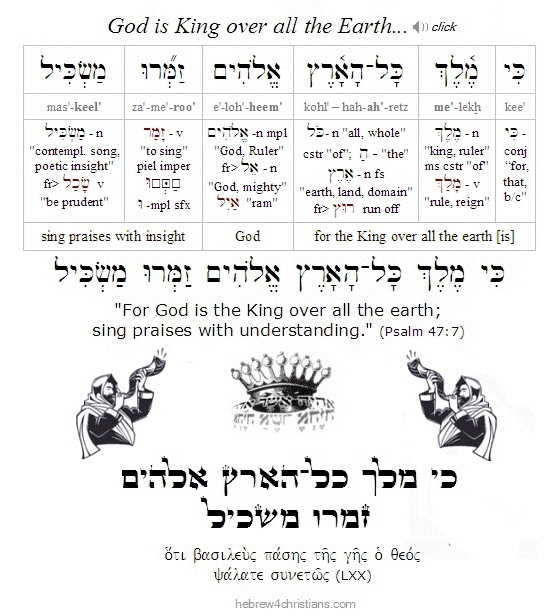 |
The holiday of Purim occurs this coming Monday, March 9th (at sundown) and runs through the following day. In anticipation of the coming holiday, then, let me wish you and your family Purim Sameach (פורים שמח) -- with the prayer that you will stand true to your faith, despite this wicked world and its syncretizing influences. Hooray for Mordecai! -- may the LORD raise up many like him!
Believing in Love...
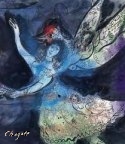
03.03.20 (Adar 7, 5780) In the Torah we read: "But now, Israel, what does the LORD your God ask from you ... but to love him with all your heart and with all your soul?" (Deut. 10:12). But how are we able to love God be'khol levavka (בכל־לבבך) – "with all our heart" – and be'khol nafshekha (ובכל־נפשׁך) - "with all our soul," apart from healing of the brokenness that makes our hearts divided and sick? That is what the redemption from Egypt was about: we were personally chosen by God, redeemed by his grace, led out from from cruel bondage, only to be led into the desert, away from the world, where we slowly began to understand that we were valued, cared for, and beloved of God. We believed in the possibility of promise, of covenant... Only then could we hear the request from heaven: "Now love Me..." In other words, we can only truly love God by knowing we are beloved by God, and the invitation to love him is a response of his great passion for you (1 John 4:19). Accept that you are accepted in the heart of the Beloved (Eph. 1:4-6).
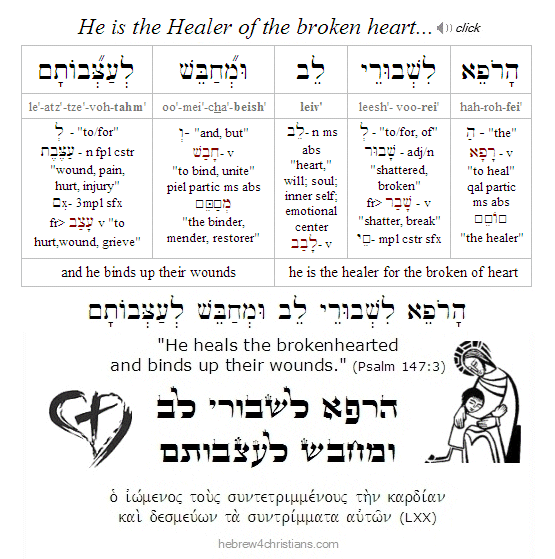 |
Oil of Illumination...

[ The following is related to this week's Torah reading, parashat Tetzaveh... ]
03.03.20 (Adar 7, 5780) From our Torah portion for this week (i.e., Tetzaveh) we read: "You shall command the people of Israel that they bring to you pure olive oil "crushed" for the light, that an eternal lamp (נר תמיד) may be set up to burn" (Exod. 27:20). The Hebrew word for "pure" olive oil is zakh (זך), which refers to the clearest oil derived from squeezing out (or crushing) the very first drop from the choicest olive. The purest of oil was obtained by a process of "crushing for the light" (כתית למאור), which symbolizes the Light of the World, the One Crushed for our iniquities, the "Man of Sorrows" (אישׁ מכאבות) who offered himself up for our healing and illumination (Isa. 53:1-5). Some things are seen only through the process of tribulation, breaking, and surrender. When we kindle this lamp, we are able to see the truth; we perceive how God's heart was crushed for the sake of our salvation...
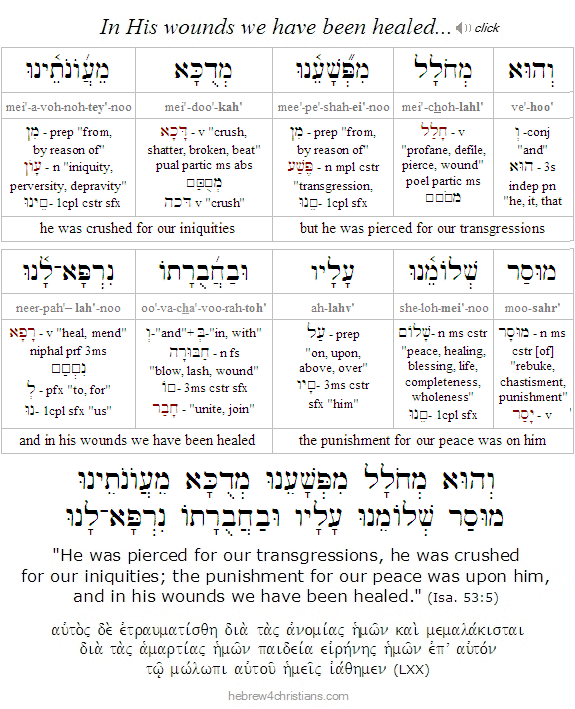 |
"Purim" in the Messiah...
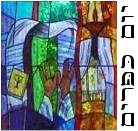
[ The holiday of Purim begins Monday, March 9th at sundown this year... ]
03.03.20 (Adar 7, 5780) During Purim we read the Scroll of Esther (מגילת אסתר) and recall how the Jewish people were providentially saved from Haman's evil plot to destroy them. However it is important to know that any day that is marked by special deliverance by God may be regarded as a "personal" or "special" Purim. Therefore some Jewish families and communities observe "special purims" to commemorate the anniversary of a particular deliverance (such as the Purim of Cairo, the Purim of Tiberius, and so on). The most special deliverance we have comes from being set free from the guilt of our sins, of course, since this gives us true peace with God (Rom. 5:1,11). In fact, Yom Kippur (the Day of Atonement) is also known as Yom Kippurim in the Tanakh, which can be read as Yom Ke-Purim (i.e., יום, "a day" + כ, "like" + פרים, "Purim"). Therefore the day on which Yeshua sacrificed Himself on the cross is the greatest Purim of all, since through His loving intervention we are eternally delivered from the hands of our enemies. Yehi shem Adonai mevorakh (הי שׁם יהוה מברך): "Blessed be the Name of the Lord."
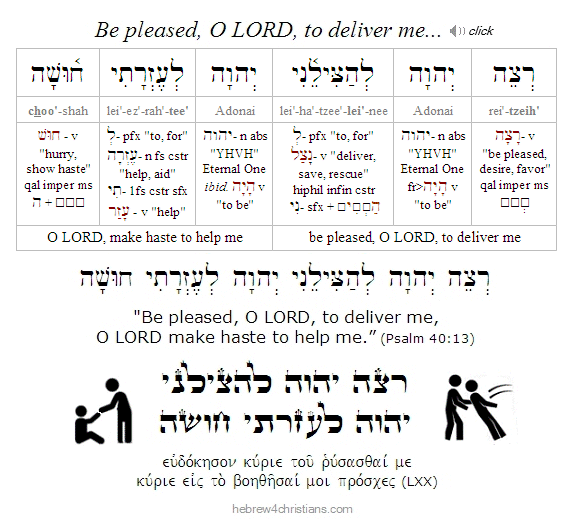 |
Sanctifying the Truth...

03.02.20 (Adar 6, 5780) How do we share the message of God with others? How do we reveal the truth of Messiah in this world? In other words, how may the Spirit of God be manifest within us? The Scriptures say first to "sanctify the Messiah" within our hearts and then we will be ready to give a reason for our hope -- though we must do so in humility and reverence before heaven" (1 Pet. 3:15). Note here that the apostle mentioned a repeated theme in the Torah, namely, to "sanctify the LORD your God" (see Deut. 5:12; Deut. 14:2; Lev. 11:44; Lev. 19:2; Lev. 20:7, etc.), and applied this directly to Yeshua the Savior (i.e., the ancient text reads: κύριον δὲ τὸν Χριστὸν ἁγιάσατε ἐν ταῖς καρδίαις ὑμῶν). Here the Spirit recalls the words of Isaiah the prophet: "Sanctify the LORD of hosts (יהוה צבאות); let him be your honor and let him be your awe" (Isa. 8:13). We sanctify the Lord by choosing to make sacred place for him within our consciousness; we enshrine him and make him beautiful within our affections and actions (Exod. 15:2). When God said to his people, "Let them make for me a sacred place (i.e., mikdash: מקדשׁ) that I may dwell in their midst," then, he was inviting them to make room within their hearts (בתוכם) for His Presence to be revealed (Exod. 25:8). King David understood this principle: "I have set the LORD always before me..." (Psalm 16:8). In other words we must open our eyes to see; we must humble ourselves to believe; and we must open our hearts before the greatness of God. This is the first step, as Yeshua taught us: Avinu shebashamayim, yitkadash shemekha - "Our Father in heaven, let your Name be sacred to me" (Matt. 6:9). As we sanctify the Lord our God, we become sanctified ourselves, we bear withness of the truth of Reality, and the Spirit of God will empower us to living signs of the Divine Presence. "But the fruit of the Spirit (פרי הרוח) is love, joy, peace, patience, kindness... (Gal. 5:22-23).
"Know therefore today, and lay it to your heart, that the LORD is God in heaven above and on the earth beneath; there is no other" (Deut. 4:39). Note that the phrase "lay it to your heart" may better be rendered as "return to your heart" (והשׁבת אל־לבבך), suggesting that the truth of the LORD is found there – within the heart that truly seeks him (Deut. 4:29). Hashivenu! In other words, the truth is found in the heart's seeking for the LORD and His love. Know this truth today... "The most important part of teaching is to teach what it is to know," that is, to know "in your heart."
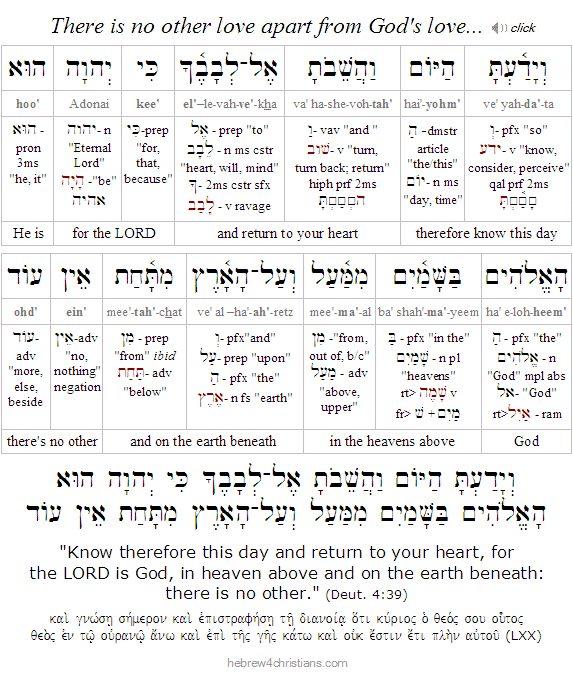 |
Note: For more on this subject see the article: "The Fruit of the Spirit."
Tetzaveh and Purim...

03.02.20 (Adar 6, 5780) Our Torah reading this week (Tetzaveh) begins with instructions for kindling the holy lampstand: "command the people of Israel to bring to you pure beaten olive oil for illumination (לַמָּאוֹר) to offer up (olah) a continual lamp (נֵר תָּמִיד)." Note that the word translated "lampstand" is menorah (מְנוֹרָה), from the word for lamp, ner (נֵר). What's interesting about this verse is that the commandment to "offer up a continual lamp" occurs before the Tabernacle - and the menorah - was even made. God's Light must shine first -- even before we can direct our worship to Him.... The Light of His Presence precedes even the "tent of meeting" itself. We cannot know God apart from his light, chaverim....
There may be a Purim connection here as well. Perhaps you are familiar with the "Urim and Thummim," the "lights and perfections" that the High Priest sometimes used to discern messages from the LORD? Some scholars believe these were like lots (purim) that were used to get "yes/no" responses from the LORD (e.g., 1 Sam. 14:41, 28:6, Ezr. 2:63; Neh. 7:65). When Haman the Agagite kept "rolling the dice" until he found the "propitious" time to seek the destruction of the Jews (Esther 3:7), God was indeed watching. After Haman "divined" the twelfth month (Adar), he appealed to the King to put his hateful plan into action... He slandered the Jews and sought to incite the King's anger against them as traitors who pledged allegiance to a different King... All this was foreseen by the LORD and under His sovereign control. Little did Haman know that the dice he cast was for the appointed day of his own death. And so it goes for all those who "cast the lot" without understanding the overarching sovereignty of God...
For more on this subject see the article: "Parashat Tetzaveh and Purim."
Sorrowful Grace...
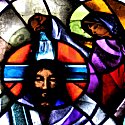
[ During the 40 days from Adar 1 until Nisan 10 we revisit themes of teshuvah (repentance) in anticipation of the coming New Year and the observance of the Passover (this is similar to the 40 days of Teshuvah we observe before Yom Kippur in the fall). ]
03.02.20 (Adar 6, 5780) While it's true that we express sorrow and regret for our sins - we mourn over our lives - this is part of the healing process, with the end result of obtaining comfort from God (Matt. 5:4). Mere regret over sin is not enough, however, since the motive may be from shame (pride) or disappointment over some selfish loss. Esau repented with tears, but his wasn't true repentance since he didn't lament the loss of his heart to God's love... True repentance leads to healing and life. When the woman from Magdala wept and washed Jesus' feet with her tears, he said, "I tell you, her sins, which are many, are forgiven -- for she loved much" (Luke 7:44-48). In other words, she was lavish in her love because she deeply regretted that she had missed what was most important, what she desperately needed all along... She saw her sin as blindness to God's love... After all, why would she weep over her sins unless she loved him? And how could she love him unless he first revealed his love to her? (1 John 4:19)
"For grief (λύπη) as intended by God produces a repentance (תְּשׁוּעָה) that leads to salvation, leaving no regret, but worldly grief produces death" (2 Cor. 7:10).
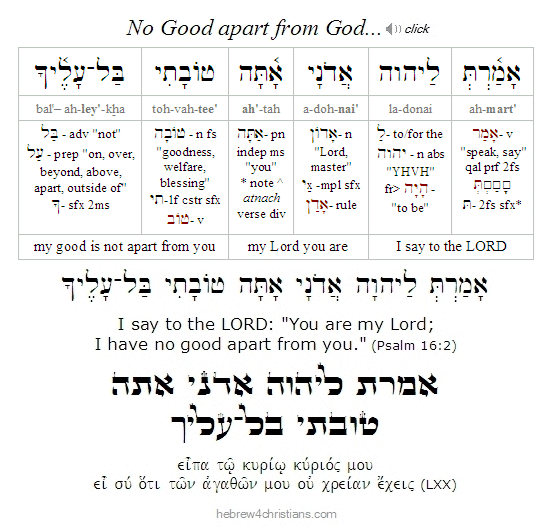 |
The Words of Light...
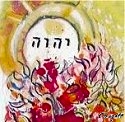
[ The following is related to this week's Torah reading, parashat Tetzaveh... ]
03.01.20 (Adar 5, 5780) Our Torah portion this week (Tetzaveh) begins with commandment to "keep the light burning" (Exod. 27:20). God's first words of creation were yehi ohr (יְהִי אוֹר), "let there be light!" (Gen 1:3), just as the Menorah served as a picture of the radiant Tree of Life. The heart looks through the eye, and how we choose to see is ultimately a spiritual decision: "If your eye is "single" (i.e., ἁπλοῦς, sincere, focused)," Yeshua said, "your whole body will be filled with light" (Matt. 6:22). In other words, when we see rightly, we will behold the radiance of God shining within us (Isa. 6:3). We are enabled to see by means of the revelation of the Word: "The entrance of your words give light (Psalm 119:130). But we must kindle the light within our hearts; we must open our eyes its brilliance, we must choose to see the Divine Presence with "eyes of the heart" that are being enlightened (Eph. 1:8). For God, who said, "Let light shine out of darkness," has shone in our hearts to give the light of the knowledge of the glory of God in the face of Yeshua the Messiah (2 Cor. 4:6). Torah ohr (תורה אור). May our "light so shine!"
פֵּתַח דְּבָרֶיךָ יָאִיר מֵבִין פְּתָיִים
pe'·tach · de·va·rey'·kha · ya·eer · mei·veen · pe·ta·yeem

"The entrance of your words give light,
giving insight to the simple."
(Psalm 119:130)

Note that the verse is often translated, "The entrance of your words give light," though it may better be rendered as "the opening up (פֵּתַח) of your words releases light." In other words, as we realize the true intent of the words - their context, usage, application, exposition, etc. - we will experience the light of revelation. Note further the play on words between "opening up" and being "open-minded" in this verse:
Tending God's Light (פרשת תצוה)

[ The following is related to our Torah reading for this week, parashat Tetzaveh... ]
03.01.20 (Adar 5, 5780) Shavuah tov, friends. Last week's Torah reading, parashat Terumah (תרומה), explained that God had asked for a "donation" (i.e., terumah) from the people for the sake of creating a portable, tent-like sanctuary called the Mishkan (משׁכּן), or "Tabernacle." God then showed Moses the pattern (תּבנית) according to which the Mishkan and its furnishings were to be made. First the Ark of the Covenant (ארון בּרית־יהוה) and its golden cover (called the kapporet: כּפּרת) would occupy an inner chamber of the tent (אהל) called the Holy of Holies (קדשׁ הקדשׁים). Within an adjoining chamber of the tent called the Holy place (הקדשׁ), a sacred Table (שׁלחן) would hold twelve loaves of unleavened bread (לחם פּנים) and a seven-branched Menorah (מנורה) would illuminate the tent. God gave precise dimensions of the tent with the added instruction to separate the Holy of Holies by a hanging veil called the parochet (פּרכת). The entire tent was to have a wooden frame (מסגּרת) covered by colored fabric and the hide of rams and goats. Outside the tent an outer court (חצר) was defined that would include a copper sacrificial altar (מזבח נחושת) and water basin (כּיּור נחשׁת). The chatzer, or outer court, was to be enclosed by a fence made with fine linen on silver poles with hooks of silver and sockets of brass.
 |
Our Torah reading for this week, parashat Tetzaveh (תצוה), continues the description of the Mishkan, though the focus shifts to those who will serve within it, namely the kohanim (כּהנים), or the priests of Israel. First Moses was instructed to tell the Israelites to bring pure olive oil (שׁמן זית זך) for the lamps of the Menorah, which the High Priest (הכּהן הגדול) was instructed to light every evening in the Holy Place. Next God commanded Moses to ordain Aaron and his sons as priests and described the sacred garments (בּגדי־קדשׁ) they would wear while they were serving in the Mishkan.
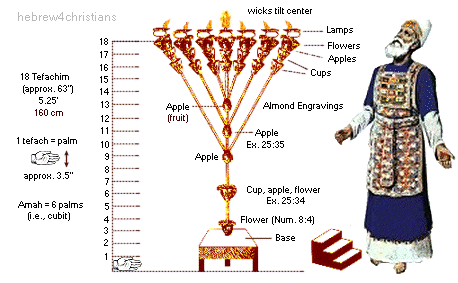 |
All priests were required to wear four garments – linen breeches, tunics, sashes, and turbans, but in addition to these the High Priest (Kohen Gadol) was to wear a blue robe that was decorated with pomegranates and golden bells. Over this robe, an ephod (אפוד) – an "apron" woven of gold, blue, purple, and crimson – was to be worn, upon which was attached a "breastpiece" (חשׁן) inlaid with precious stones inscribed with the names of the 12 tribes of Israel. The ephod also contained a pouch holding two unique gemstones called the urim v'tummin (אורים ותומים), usually translated as "lights and perfections." According to the Targum Jonathan, when a matter was brought to the High Priest for settlement, he would sometimes hold the urim (from אוֹר, "light") and tummin (from תָּם, "integrity" or "completeness") before the Menorah in the Holy Place and the Shekhinah would light up various letters inscribed on the gemstones to reveal the will of God. Finally, the High Priest would wear a golden plate (i.e., tzitz zahav: צּיץ זהב) engraved with the words, "Holy to the LORD" (קדשׁ ליהוה) upon the front of his turban.
The priests were to be ordained in a seven-day consecration ceremony that involved washing, dressing, and anointing them with oil and blood, followed by the offering of sacrifices. The priests were further instructed to present burnt offerings twice a day upon the copper altar. The portion ends with a description of the Golden Altar (מזבּח הזהב) also called the Altar of Incense (מזבּח הקטרת) upon which incense (i.e., ketoret: קטרת) was offered twice a day by the priests when the Menorah lamps were serviced. In addition, the blood of atonement was to be placed on its corners once a year, during the Yom Kippur ritual.
|





